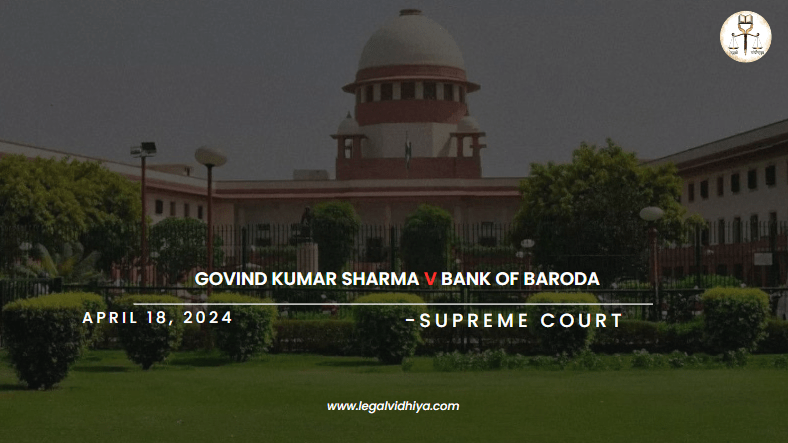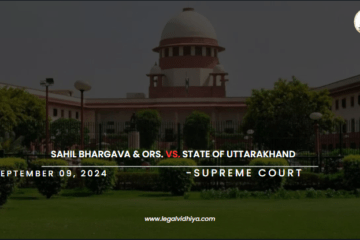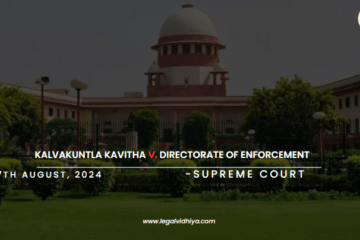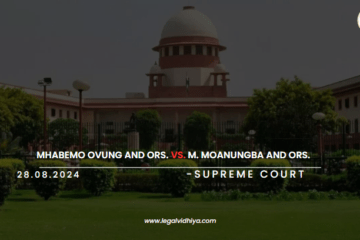
| CASE NO. | C.A. No.-005028-005028 / 2024 |
| DATE OF JUDGEMENT | April 18, 2024 |
| COURT | Supreme Court of India |
| APPELLANT | Govind Kumar Sharma and others |
| RESPONDENT | Bank of baroda |
| BENCH | Mr. Justice vikram nath , Hon’ble Mr. Justice Satish chandra Sharma |
INTRODUCTION
In the case of Govind Kumar Sharma & Anr vs Bank of Baroda & Ors, the central issue revolves around the validity of a property auction/sale conducted by the Bank of Baroda and the subsequent legal consequences of setting aside that sale due to the Bank’s failure to comply with mandatory notice requirements. The appellants, who were originally owners of the property in question, challenged the sale and asserted their right to retain possession as tenants following the sale’s annulment.
FACT OF THE CASE
1.The appellants, who were tenants, became owners after an auction sale but saw their status revert due to non-compliance by the Bank.
2.The respondent, the borrower, filed an application challenging the sale under Section 17 of the SARFAESI Act.
3.The appellants challenged the judgement and order passed by the Allahabad High Court. The High Court dismissed the Writ Petition of the appellants.
4.The orders passed by the Debt Recovery Tribunal and the Debt Recovery Appellate Tribunal set aside the auction sale in favour of the appellants and dismissed the appeal.
5.In the recovery proceedings, the Recovery Officer conducted an open auction where the appellants emerged as the highest bidder.
6.The Bank failed to follow mandatory notice requirements before conducting the auction/sale.The sale was rightly set aside based on the above finding.Upon setting aside the sale, the appellants’ status as owners automatically reverted to that of tenants.
7.The appellants are not obligated to hand over physical possession to the Bank.The direction for the Bank to first take possession and then refund the auction money with fixed deposit interest is incorrect.
ISSUES RAISED
1Whether the auction sale conducted by the Bank was valid and binding on the appellant ?
2. Whether the Bank complied with the provisions of the Securitization and Reconstruction of Financial Assets and Enforcement of Security Interest (SARFAESI) Act, 2002, while conducting the auction sale ?
3. Whether the Bank provided adequate notice to the appellants before conducting the auction sale or the appellants’ status as owners or tenants was affected by the auction sale ?
4. Whether the appellants were entitled to a refund of the auction money with interest.
5. Whether the borrower (owner of the property) had the right to evict the appellants legally ?
ARGUMENT OF PETITIONER
The appellants, including Govind Kumar Sharma and others, vehemently assert that the auction sale orchestrated by the Bank of Baroda on 28.02.2014, in accordance with the SARFAESI Act, 2002, stands as a nullity. They argue that this action is in direct contravention of the mandatory provisions enshrined within the Act and its corresponding Rules. Specifically, they point out the Bank’s failure to adhere to essential procedural mandates, including the service of notice under Section 13(2) of the SARFAESI Act, 2002, to the appellants, who held the status of tenants for the property in question. Additionally, they highlight the Bank’s lack of compliance with procedural requirements stipulated by the Rules. The absence of a notice issued under Section 13(4) of the Act, which is meant to inform them of the impending sale of the secured asset, further compounds their argument. Consequently, the appellants assert that these deviations from prescribed procedures render the auction sale null, void, and illegal.
ARGUMENT OF RESPONDENT
The respondent, Bank of Baroda, vehemently maintains the validity and legality of the auction sale conducted on 28.02.2014, emphasising its meticulous adherence to the provisions delineated within the SARFAESI Act, 2002, and its accompanying Rules. It asserts that the auction sale constituted a lawful exercise of its statutory powers under the Act, conducted in strict conformity with prescribed legal requirements and procedural safeguards.
The Bank underscores its unwavering commitment to compliance with statutory notice requirements mandated by the SARFAESI Act, 2002, and corresponding Rules. It avows that all requisite notices, including those stipulated under Sections 13(2) and 13(4) of the Act, were duly served upon both the borrowers and the appellants. This meticulous adherence to notice provisions underscores the Bank’s dedication to procedural regularity and transparency in executing the auction sale.
Asserting its adherence to due process, the Bank underscores the scrupulous observance of procedural fairness throughout the auction sale process. It contends that the sale was conducted with utmost transparency and impartiality, affording all relevant stakeholders the opportunity to participate in accordance with established legal norms and principles of equity. The Bank emphasises its commitment to upholding procedural integrity to safeguard the interests of all parties involved.
In response to the appellants’ assertion of ownership rights, the Bank reiterates the appellants’ status as tenants of the property in question. It contends that the appellants lack any substantive right, title, or interest in the property beyond their tenancy arrangement. Consequently, the Bank argues that the auction sale, being a disposition of ownership rights, does not infringe upon or impair the appellants’ tenancy rights, thereby refuting their claim to ownership or entitlement to legal recourse.
JUDGMENT
The Supreme Court set aside the auction sale conducted by the Bank of Baroda on 28.02.2014, holding that the sale was invalid and illegal. The Court held that the Bank failed to comply with the statutory notice requirements under Section 13(2) and 13(4) of the SARFAESI Act, 2002, and the Rules framed thereunder.
The Court further held that the appellants, who were tenants of the property, had a right to be heard before the auction sale, and the Bank’s failure to serve them with a notice under Section 13(4) of the Act was a serious infirmity. The Court directed the Bank to refund the auction money with interest to the appellants.The Court also held that the appellants’ status as tenants was restored, and they were entitled to remain in possession of the property. The Court dismissed the Bank’s appeal and upheld the appellants’ contentions.
In essence, the Supreme Court held that the Bank’s failure to comply with the statutory notice requirements and its failure to give the appellants an opportunity to be heard rendered the auction sale invalid and illegal. The Court restored the appellants’ status as tenants and directed the Bank to refund the auction money with interest.
CASE ANALYSIS
In the case of Govind Kumar Sharma & Anr vs Bank of Baroda & Ors, the Supreme Court rendered a landmark judgement concerning the validity of an auction sale conducted by the Bank of Baroda under the SARFAESI Act, 2002. The Court ruled that the auction sale, held on 28.02.2014, was invalidated due to the Bank’s failure to adhere to statutory notice requirements outlined in Sections 13(2) and 13(4) of the Act, and its corresponding Rules.
Furthermore, the Court emphasised the fundamental right of tenants, including the appellants, to be heard before any auction sale, highlighting the Bank’s omission to serve them with a notice under Section 13(4) as a critical flaw. Consequently, the Court directed the Bank to refund the auction money to the appellants, along with interest, while restoring their status as tenants and affirming their entitlement to remain in possession of the property. This judgement underscores the judiciary’s commitment to upholding procedural fairness, protecting tenant’s rights, and ensuring compliance with legal requirements in property transactions governed by the SARFAESI Act, 2002.
In conclusion,
The verdict in Govind Kumar Sharma & Anr vs Bank of Baroda & Ors serves as a significant milestone in property law jurisprudence, particularly concerning the execution of auction sales under the SARFAESI Act, 2002. The Supreme Court’s decision highlights the paramount importance of procedural compliance and protection of tenant’s rights in such transactions. By setting aside the auction sale due to the Bank’s failure to adhere to statutory notice requirements and ensuring the restitution of the appellants’ status as tenants, the Court reaffirmed its commitment to upholding fairness and equity in property transactions.
Furthermore, the directive for the Bank to refund the auction money with interest underscores the judiciary’s dedication to rectifying wrongful actions and restoring parties to their rightful positions. Overall, this judgement serves as a beacon for ensuring procedural regularity, safeguarding the interests of all stakeholders, and promoting justice in property disputes governed by the SARFAESI Act, 2002.
REFERENCE
1. Advocate khoj https://www.advocatekhoj.com/library/judgments/announcement.php?WID=17505
2. NewsLaw BY Sakshi Bajwa Published on (24 APRIL 2024) https://newslaw.in/case-type/civil/auction-sale-set-aside-govind-kumar-sharma-vs-bank-case-summary/
3. Verdictum By Swasti Chaturved Published on (|20 Apr 2024 8:30 PM)
This Article is written by Rana Saman student of AL Ameen college of law (bengaluru) ; Intern at Legal Vidhiya.
Disclaimer: The materials provided herein are intended solely for informational purposes. Accessing or using the site or the materials does not establish an attorney-client relationship. The information presented on this site is not to be construed as legal or professional advice, and it should not be relied upon for such purposes or used as a substitute for advice from a licensed attorney in your state. Additionally, the viewpoint presented by the author is of a personal nature.




0 Comments